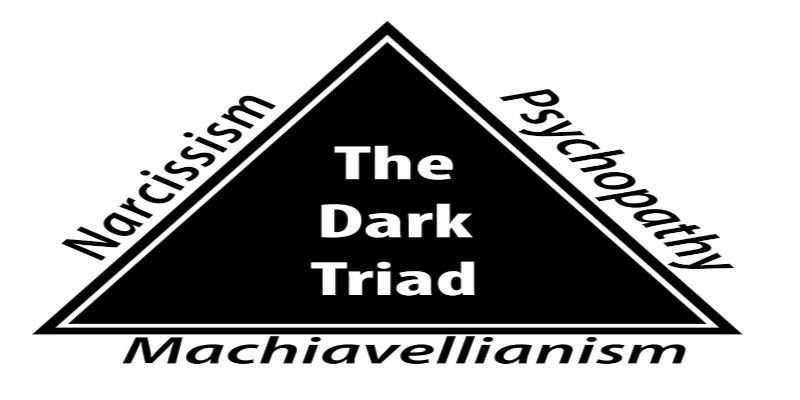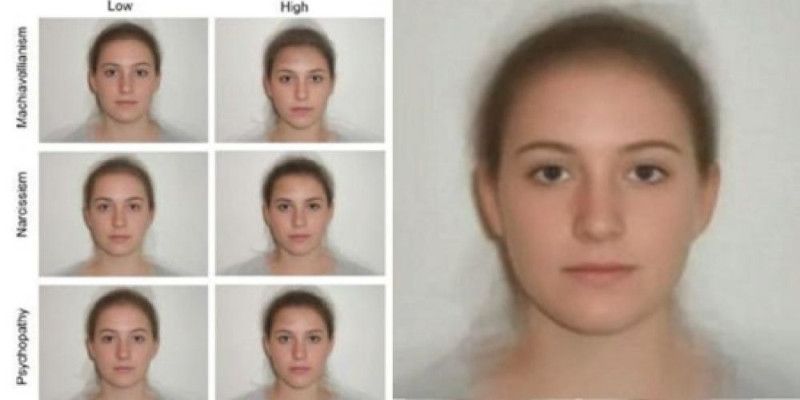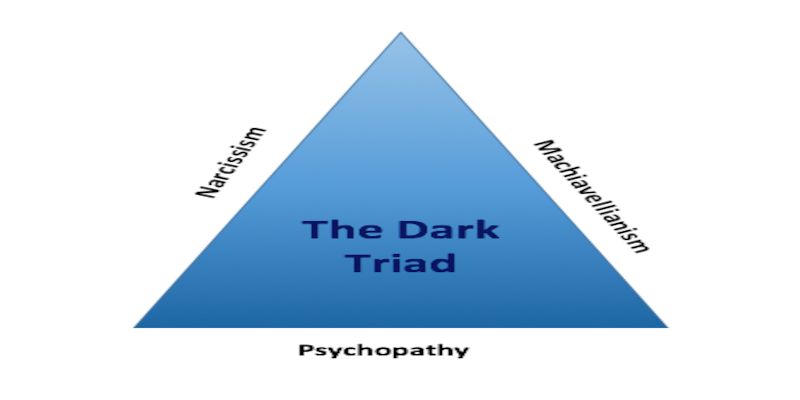Table of Contents
ToggleToday, we’re going to explain the dark triad personality traits.
Most personality traits in life should be seen as neutral. Neither as good nor bad.
For example, people who are high in personality trait agreeableness have both the trait’s advantages but also disadvantages. The same can be said about disagreeable people. Thus, making it a neutral personality trait.
While most characteristics are impartial, the dark traits are generally seen as non-desirable personality traits.
What is the dark triad?

The dark triad of personality refers to a combination of 3 generally negatively associated personality traits.
- Narcissism
- Machiavellianism
- Psychopathy
Narcissism
Narcissism can be defined as an excessive admiration of oneself
Narcissistic people tend to be boastful, arrogant, selfish, lacking in empathy, and, due to their excessive self-love, hypersensitive to criticism.
Machiavellianism
Its main features are callousness, being manipulative, and a general indifference to morality.
A Machiavellian person is so focused on their self-interests that they have no qualms about deceiving, manipulating, and exploiting other people to reach their goals and personal desires.
Psychopathy

Psychopathy, also commonly called sociopathy, is a personality disorder set apart by lasting antisocial behavior, egoistical traits, and often impulsive, disinhibited behavior together with an impaired capacity or even an absent feeling of remorse and empathy for other people.
It’s considered the worst of the dark triad traits since they don’t have much empathy in addition to being impulsive and adventurous.
Despite all this, psychopaths can appear surprisingly normal in their behavior to other people in their daily lives.
Despite their sometimes seemingly normal, possibly even charming attitude, they are void of any pretense of conscience.
How to identify dark triad traits

Multiple questionnaires exist to determine if an individual is exhibiting certain dark triad traits.
But needless to say, we can’t go around taking questionnaires from our surrounding people. That’s why I compiled the following list of patterns that are commonly associated with narcissism, Machiavellianism, and psychopathy.
Lying
Although not only people suffering from dark triad traits exhibit patterns of consistent, pathological lying, they tend to do so to a fault.
People suffering from narcissism tend to rate themselves more highly and, thus, tend to think of themselves as good at deception and getting away with lying. Since narcissistic people tend to rate themselves too highly and might be arrogant, this might not always be true.
People suffering from psychopathy tend to lie for no reason at all and about everything. They tend to be very good liars since they lack a feeling of remorse and empathy.
Furthermore, a person suffering from psychopathy can appear charming to the world as well. At least for a while until their unusual behavior becomes apparent.
Jealousy

Narcissists tend to have a higher-than-average amount of self-importance and self-love, they hate the thought of people not reciprocating their sense of self-importance.
Thus, they are known to exhibit more feelings of jealousy. Even before they’ve been given a valid reason to do so.
Revenge
Psychopaths, narcissists, and people suffering from Machiavellianism are more likely to take revenge since they tend to think more highly of themselves and hate the thought of other people not reciprocating these feelings.
Not only that, but their self-esteem can take a big hit if someone misuses their trust in their eyes, making them feel used and left angry, and confused in the process.
Ironically enough, they tend to ruthlessly make use of other people as they see fit for their personal goals and benefits, but can not handle the thought of being used themselves.
Short lasting relationships

People suffering from narcissism, Machiavellianism, and/or psychopathy tend to have a hard time making long-lasting, stable relationships due to being hard to get along with, lacking empathy, and tact, and in general, their antisocial personality traits.
Furthermore, the longer a relationship continues, the more people start to figure out something is ‘off’ about the people suffering from the dark triad personality traits.
And even if that person is low on the scale of those particular negative personality traits, it’s still a challenge and a half to make it work.
Superficial relationships
Since their lack of emotional connectivity in a relationship, people high on the dark triad personality scale tend not to commit to a serious, stable relationship.
They tend to be less committed, and emotionally shallow both in romantic relationships and with friends since they are looking to satisfy their own needs with a disregard for the other involved party.
Infidelity

Given their impulsivity, lack of empathy, lack of care for others, and general ability to lie and deceive others masterfully, it isn’t surprising that they are more likely to cheat in a relationship.
Furthermore, due to their increased sense of self-importance and self-love, they are more likely to engage in said behavior to satisfy their own needs.
Low agreeableness
Agreeableness is a characteristic of the Big Five personality traits.
Having low agreeableness means you’re competitive, combative, blunt, distant, and not all that empathetic by nature. This in itself is not all that bad, and not necessarily a sign that you have a dark triad personality. Because low agreeableness is a naturally occurring phenomenon in perfectly healthy human beings.
However low agreeableness is strongly correlated with exhibiting dark triad signs.
How do you treat dark triads?

You can’t treat dark triads, since there’s no cure.
But, you can learn how to deal with the traits of Machiavellianism and narcissism.
This is often accomplished through cognitive behavioral therapy (CBT) since it is highly effective to stop negative thoughts or to turn them into more positive and realistic ones. It also aids in making the affected person aware of their thinking and actions, and how those influence other people.
How to manage people exhibiting dark triad traits

Helping and/or managing people exhibiting dark triad personality traits is a difficult thing, but not always impossible. But we must certainly know how to deal with them.
Important to note is that there is no clear answer to how one should manage affected people since it’s a complex area with no straightforward answers.
For starters, no two people are the same. To this extent, people exhibiting these negative characteristics will do so to varying degrees. This means that not everyone will exhibit the same amount or severity of narcissism, Machiavellianism, and/or psychopathy.
The number one question that arises regarding helping people exhibiting dark triad traits is the following: “Is the person willing to change their behavior?”
If not, it’s going to be an almost impossible task to keep said person in check. Because helping people involves an introspective motivation of the affected person for the intervention to be successful.
Dark triad facial features
There have been some studies conducted that suggest that narcissism, particularly grandiose narcissism, can be detected in people’s physical appearance. This suggests that there are certain dark triad facial features.
Folks exhibiting narcissistic traits are typically physically attractive, dress impeccable and clean, and often wear makeup or dress provokingly in order to flaunt and accentuate their looks. Perhaps because this gets them more attention and puts them in the spotlight.
One particular study in 2018 found that grandiose narcissists tend to have characteristic and well-groomed, neat eyebrows.[1]Giacomin, M., & Rule, N. O. (2018). Eyebrows cue grandiose narcissism. Journal of Personality. doi:10.1111/jopy.12396

However, people looking at images of faces displaying the dark triad signs machiavellianism and psychopathy have not been able to detect those characteristics.[2]Shiramizu, V., Kozma, L., DeBruine, L., & Jones, B. (2019). Are dark triad cues really visible in faces? Personality & Individual Differences, 139, 214–216.
More comprehensive studies with a larger population are needed in order to find out if facial features can truly dependably display the dark triad personality traits.
What is the opposite of dark triad?

It turns out that there is such a thing that’s considered the opposite of the dark triad, which is conveniently called the light triad.
This scale evaluates people by their answers to questions such as:
- I think that most people are good-natured
- I think most people are honest
- I rarely think about what I want when interacting with others
- I enjoy listening to people from different professions.
Dark triad examples

An example of having a relationship with someone who possesses dark triad traits could be having a partner who’s constantly trying to manipulate their spouse by lying and superficial charm.
They put their own needs and desires first since they think that they’re superior, and deserve all the love that’s coming their way.
Yet, the slightest hint of criticism sets them off, because they’re extremely sensitive. Even more, they take revenge by cheating on their partner, rationalizing that they deserve that pain since they hurt them first.
Final note

Individuals who possess a dark triad personality can deeply and negatively affect other people’s mindsets. Furthermore, it can make living as well as working with an affected person hard and challenging.
The two things you always want to do are protect yourself and look if the person is open to accepting help. If not, it’s almost impossible to help or change a person’s mentality or behavior.
Important to note is that these dark traits will influence people to varying degrees. With some people, it might barely be noticeable, while with others, it severely impacts their lives negatively.
References[+]

1 thought on “The dark triad personality traits explained”
Comments are closed.